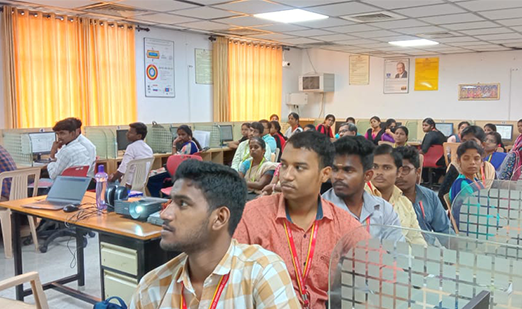Artificial Intelligence and Data Science
Department Introduction
The Department of Artificial Intelligence and Data Science was established in the year 2021 with an intake of 60 students. It is a popular outgrowth of computer science that is utilized to solve today's technologically complicated problems.
The department offers UG programme leading to B.Tech. in Artificial Intelligence & Data Science with the ability to sensitize pupils to execute intelligent data analysis and impart knowledge of advanced technologies.
The Department has cutting-edge laboratory infrastructure, which is required to integrate the theoretical and practical facets of engineering.
The department's faculty members are well-trained and experienced in the fields of artificial intelligence and data science.
- B.Tech Artificial Intelligence and Data Science


Vision Of The Department
- Foster competent professionals by inculcating knowledge and skills in the Artificial Intelligence and Machine Learning empire to cater needs of industry and society.

Mission Of The Department
- To provide a good environment with latest technological infrastructure facilities and interaction with industry in the field of Artificial Intelligence and Data Science.
- To educate the students in problem solving with necessary skills to solve real world problems.
- To strengthen the assimilation process of concepts in AI & ML through experiential learning.
- To create a better Academia-Industry liaison by means of skill enhanced training.
/B.Tech Artificial Intelligence and Data Science
Graduates can
- Utilize their proficiencies in the fundamental knowledge of basic sciences, mathematics, Artificial Intelligence, data science, and statistics to build systems that require management and analysis of large volumes of data.
- Advance their technical skills to pursue pioneering research in the field of AI and Data Science and create disruptive and sustainable solutions for the welfare of ecosystems.
- Think logically, pursue lifelong learning, and collaborate with an ethical attitude in a multidisciplinary team.
- Design and model AI-based solutions to critical problem domains in the real world.
- Exhibit innovative thoughts and creative ideas for effective contribution towards economy building.
GRADUATE ATTRIBUTE
- Engineering knowledge: Apply the knowledge of mathematics, science, engineering fundamentals, and an engineering specialization to the solution of complex engineering problems.
- Problem analysis: Identify, formulate, review research literature, and analyse complex engineering problems reaching substantiated conclusions using first principles of mathematics, natural sciences, and engineering sciences.
- Design/development of solutions: Design solutions for complex engineering problems and design system components or processes that meet the specified needs with appropriate consideration for the public health and safety, and the cultural, societal, and environmental considerations.
- Conduct investigations of complex problems: Use research-based knowledge and research methods including design of experiments, analysis and interpretation of data, and synthesis of the information to provide valid conclusions.
- Modern tool usage: Create, select, and apply appropriate techniques, resources, and modern engineering and IT tools including prediction and modeling to complex engineering activities with an understanding of the limitations.
- The engineer and society: Apply reasoning informed by the contextual knowledge to assess societal, health, safety, legal and cultural issues and the consequent responsibilities relevant to the professional engineering practice.
- Environment and sustainability: Understand the impact of the professional engineering solutions in societal and environmental contexts, and demonstrate the knowledge of, and need for sustainable development.
- Ethics: Apply ethical principles and commit to professional ethics and responsibilities and norms of the engineering practice.
- Individual and team work: Function effectively as an individual, and as a member or leader in diverse teams, and in multidisciplinary settings.
- Communication: Communicate effectively on complex engineering activities with the engineering community and with society at large, such as, being able to comprehend and write effective reports and design documentation, make effective presentations, and give and receive clear instructions.
- Project management and finance: Demonstrate knowledge and understanding of the engineering and management principles and apply these to one’s own work, as a member and leader in a team, to manage projects and in multidisciplinary environments.
- Life-long learning: Recognize the need for, and have the preparation and ability to engage in independent and life-long learning in the broadest context of technological change.
Graduates should be able to:
- evolve AI based efficient domain specific processes for effective decision making in several domains such as business and governance domains.
- Arrive at actionable Foresight, Insight, hindsight from data for solving business and engineering problems
- Create, select, and apply the theoretical knowledge of AI and Data Analytics along with practical industrial tools and techniques to manage and solve wicked societal problems.
- Develop data analytics and data visualization skills, skills pertaining to knowledge acquisition, knowledge representation and knowledge engineering, and hence be capable of coordinating complex projects.
- Able to carry out fundamental research to cater the critical needs of the society through cutting edge technologies of AI.


